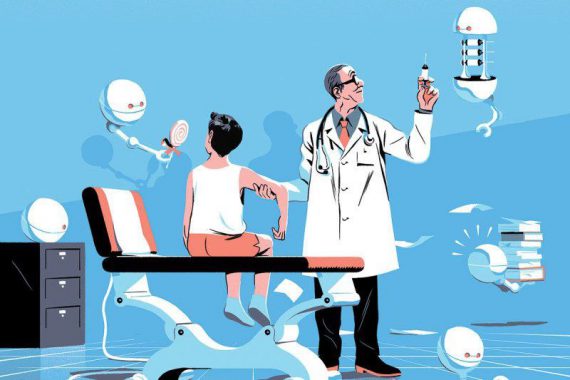There’s one industry that artificial intelligence can greatly enhance, however, it is also the one that can suffer the most from any misuse of the technology. It’s been a while since researchers have started to weigh the pros and cons of using AI in healthcare and the case is still controversial.
On the one hand, the introduction of robots and artificial intelligence in the medical system can speed up the processes, free the doctors of dull and repetitive duties so they can focus their entire attention on patients and, most importantly, can help people stay healthy.
On the other hand, AI systems have access to a lot of sensitive data about people’s medical history. A group of researchers at Harvard and MIT is making us aware that these systems may have unintended consequences. According to the paper they published on the online media outlet Science, there’s always the possibility of adversarial attacks, which constitute manipulations that can change the behavior of AI systems using small pieces of digital data. This can lead to patients being misdiagnosed, which eventually might affect people’s lives and their survival chances.
The good about AI in healthcare
The hype around artificial intelligence and the great benefits that it brings in many domains have allowed for its adoption in the healthcare system as well. There is even a debate going on in the medical world whether human physicians will be totally replaced by AI doctors sometime in the future. But that’s a different discussion, there’s a long way to go until we get there. Nowadays, AI systems can assist physicians in making better clinical decisions and, in some cases, can even replace human judgement in certain functional areas of healthcare (e.g. radiology).
DATA MANAGEMENT AND DIAGNOSIS
One area that AI can help with in healthcare is handling the medical data. So far, all the information about patients is included in medical notes, electronic recordings from medical devices, physical examinations and clinical laboratory and images. With the help of machine learning or NLP (Natural Language Processing), relevant medical information is unlocked faster. The information can then be used for making better clinical decisions.
For instance, Google Deepmind Health is used to mine medical records in order to offer better and faster health services. It is able to process huge amounts of medical information within a matter of minutes.
With regard to diagnosis, until now, the most common use cases we’ve seen in healthcare are in the field of neurology, cardiology and oncology. As an example, Manipal Hospitals in India have deployed IBM Watson for cancer care. Nevertheless, progress has been registered also in diagnosing eye diseases. Google, in coordination with Moorfields Eye Hospital NHS Foundation Trust, is aiming to improve eye treatment using machine learning.
HANDLING REPETITIVE AND DULL TASKS
Being a doctor is great, but it also requires a lot of time and effort doing things that bring less value both to the patient and the field of medicine. Entering patient data into a computer or filling in paperwork are important and need to done, yet it keeps the medical staff occupied and unable to attend patients and their needs. Artificial intelligence and robots, in particular, can handle these tasks much faster and much better. This way, doctors can spend more time thinking of alternative treatments, identifying better options for the patients and even talking to them, understanding their needs or comforting them. Taking x-ray scans, CT scans or analyzing tests can also be handled by robots that can do it faster and with better results. AI pattern recognition software can detect anomalies in scans, helping doctors carry out earlier diagnosis and improve patients’ survival chances.
According to IBM, its Medical Sieve exploratory project plans to build the next-generation “cognitive assistant” which is capable of analytics and reasoning with a vast range of clinical knowledge. Medical Sieve can help in making the clinical decision regarding cardiology and radiology.
AI-BASED RECEPTION
AI chatbots are not a novelty, they are used in numerous industries and the healthcare system makes no exception. Using NLP and deep learning (DL) to understand patients’ requests and improve their responses with each interaction, AI receptionists can perform a lot of tasks in a shorter amount of time and with greater accuracy than a human. They are programmed to asses the level of urgency and importance of a request and are able to transfer them to a human when the situation requires it.
Continue with The dark side of AI in healthcare on Strongbytes’ blog.

